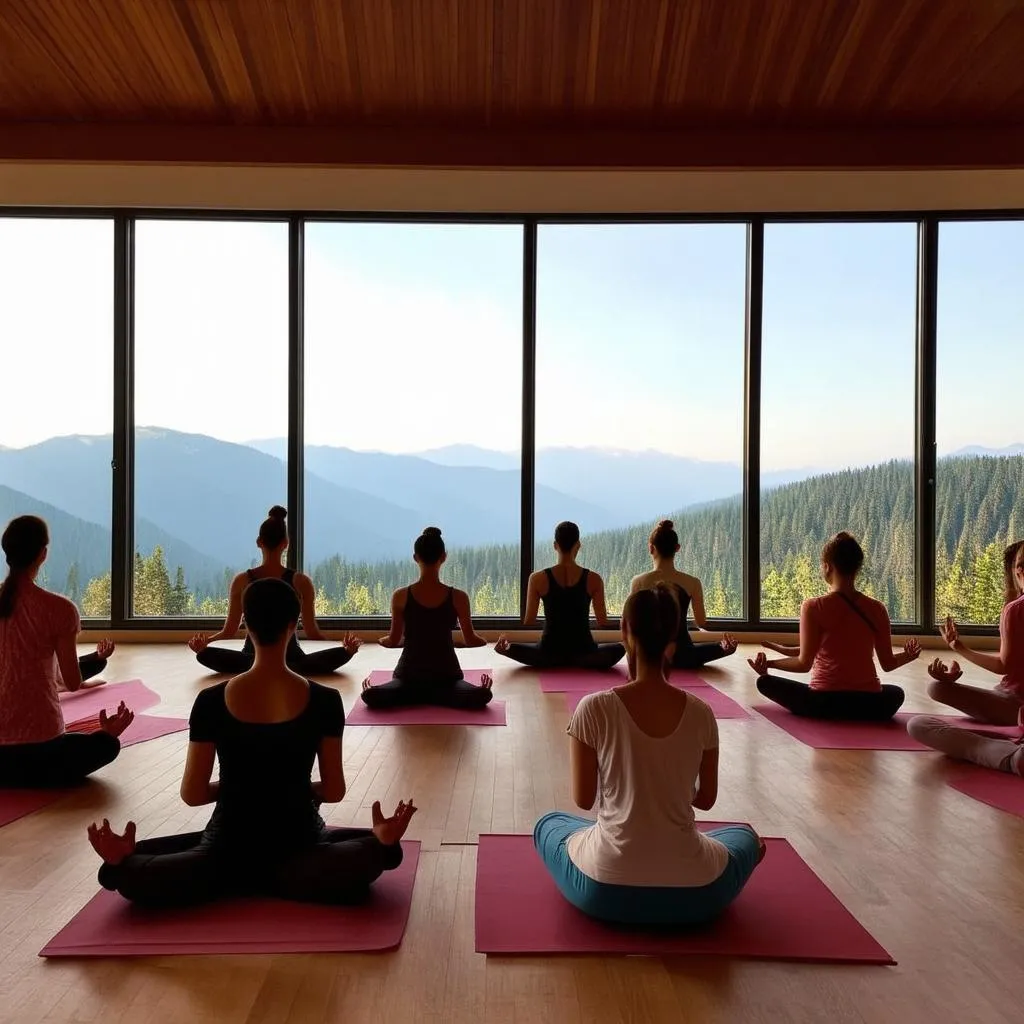Have you ever felt the urge to escape the daily grind and connect with something bigger than yourself? Perhaps standing beneath the soaring arches of a cathedral, trekking to a sacred mountaintop, or meditating in a serene temple calls to you. If so, you might be drawn to the growing trend of spiritual tourism.
What is Spiritual Tourism?
Spiritual tourism, sometimes called faith tourism or religious tourism, is more than just visiting ancient temples or attending religious ceremonies. It’s a journey embarked upon to seek meaning, purpose, and a deeper connection with oneself and the divine.
Think of it like this: imagine visiting Angkor Wat in Cambodia, not just to marvel at its architectural grandeur, but to feel the pulse of ancient Khmer spirituality resonating through its stones. Or picture yourself meditating alongside Buddhist monks in a monastery nestled in the Himalayas, not as a tourist, but as a student of mindfulness seeking inner peace.
Beyond the Temples and Shrines: Different Forms of Spiritual Tourism
Spiritual tourism encompasses a broad spectrum of experiences. It can be:
- Pilgrimages: Journeys to sacred sites like Mecca for Hajj, or tracing the footsteps of Buddha in Bodh Gaya, India.
- Wellness Retreats: Yoga and meditation retreats in serene locations like Bali or Thailand, focusing on inner transformation and self-healing.
- Nature-Based Experiences: Connecting with the divine through the awe-inspiring power of nature, like hiking the Camino de Santiago in Spain or participating in a Native American vision quest.
- Cultural Immersion: Engaging with local communities and their spiritual practices, such as attending a traditional tea ceremony in Japan or learning about the ancient wisdom of shamanism in Peru.
The Benefits of Spiritual Travel: More than a Souvenir
Spiritual tourism offers a wealth of benefits that go beyond typical travel souvenirs:
- Self-Discovery: Stepping outside your comfort zone and immersing yourself in new spiritual practices can lead to profound insights and personal growth.
- Enhanced Mindfulness: Practices like meditation, yoga, or simply being present in nature can calm the mind, reduce stress, and cultivate a sense of inner peace.
- Cultural Understanding: Engaging with different faiths and traditions fosters empathy, tolerance, and a broader perspective on the world.
- Connection and Community: Spiritual journeys often attract like-minded individuals, creating opportunities for meaningful connections and a sense of belonging.
 meditation retreat
meditation retreat
Planning Your Spiritual Journey: Finding Your Path
Embarking on a spiritual journey requires careful planning and introspection. Here’s a guide to get you started:
1. Define Your Intentions: Why are you drawn to spiritual tourism?
Are you seeking solace, enlightenment, a deeper connection with your faith, or simply a break from the mundane? Identifying your motivations will help you choose the right destination and experiences.
2. Choose Your Destination Wisely: Where does your spirit yearn to go?
Research different locations and their spiritual significance. For example, if you’re drawn to Buddhism, consider destinations like Nepal, Bhutan, or Thailand.
3. Research and Respect Local Customs: Pack your open mind and respectful attire.
Familiarize yourself with local customs, traditions, and appropriate dress codes to ensure respectful engagement with the local culture and religious practices.
4. Embrace the Journey, Not Just the Destination: Remember, it’s not a race.
Approach your spiritual journey with an open heart and mind. Allow yourself to be present in each moment, embrace unexpected encounters, and be receptive to the lessons and insights that unfold along the way.
Spiritual Tourism: A Growing Trend
As our world becomes increasingly fast-paced and materialistic, more and more people are seeking solace and meaning through spiritual tourism. This growing trend is reflected in the:
- Rise of Wellness Tourism: The global wellness tourism market is booming, with a projected value of trillions of dollars by 2025, demonstrating the increasing desire for experiences that prioritize mental, physical, and spiritual well-being.
- Popularity of Retreat Centers: From silent meditation retreats to yoga and wellness centers, the demand for spaces dedicated to spiritual practices and self-discovery is on the rise.
- Focus on Sustainable and Ethical Travel: Many travelers are seeking spiritual experiences that align with their values, leading to a growing interest in eco-friendly accommodations, community-based tourism, and responsible travel practices that respect local cultures and environments.
 meditation by the sea
meditation by the sea
Frequently Asked Questions About Spiritual Tourism
Here are some common questions travelers have about spiritual tourism:
1. Is spiritual tourism only for religious people?
Not at all! Spiritual tourism is for anyone seeking meaning, purpose, or a deeper connection with themselves and the world around them, regardless of their religious beliefs.
2. What if I’m not sure where to start?
Consider your interests and what resonates with you. Do you feel drawn to specific religions, philosophies, or practices? Start by researching destinations and experiences related to those areas.
3. How can I find authentic spiritual experiences?
Look for opportunities to engage with local communities, participate in traditional ceremonies respectfully, and support ethical and sustainable tourism initiatives.
4. What are some tips for making the most of my spiritual journey?
Approach your journey with an open mind and heart, be respectful of local customs, and embrace the opportunity for self-reflection and personal growth.
Travelcar.edu.vn: Your Guide to Meaningful Journeys
At Travelcar.edu.vn, we believe that travel is more than just ticking off destinations; it’s about collecting experiences that enrich your soul. Whether you’re drawn to the ancient temples of Angkor Wat, the serene beauty of Ha Long Bay, or the vibrant spiritual traditions of Hoi An, we’re here to help you plan a journey that aligns with your values and aspirations.
Contact us today to start planning your spiritual adventure!
Conclusion: Embrace the Transformative Power of Spiritual Travel
Spiritual tourism is a deeply personal and transformative experience. It’s an opportunity to step outside the ordinary, connect with something greater than yourself, and embark on a journey of self-discovery. So, listen to the whispers of your soul, pack your bags, and set off on an adventure that will nourish your spirit and leave an imprint on your heart.
We invite you to share your own experiences or ask any questions you may have about spiritual tourism in the comments below. Let’s inspire each other to embark on journeys that matter!